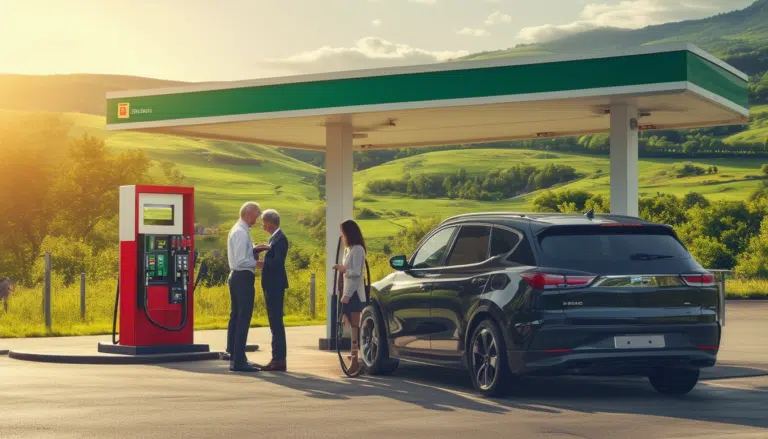La conexión entre sustainability y reducción de fuel cost
Sabotage sustainability and fuel expenditure reduction are intrinsically linked in our quest for a more responsible and ecological future. In a context where energy consumption keeps rising, efficiency in resource use becomes a primary goal for industries and individuals. Adopting practices that prioritize sustainability not only allows for reducing environmental impact but also translates into significant economic savings. Therefore, investigating and applying strategies that promote this connection is vital for advancing towards sustainable mobility and a healthier planet.
Sustainability has become a central theme on the global agenda, especially in the context of fuel savings. This not only implies a concern for the environment but is also intrinsically related to energy efficiency and responsible resource use. In this article, we will explore how both areas are interconnected and how the implementation of sustainable strategies can lead to a significant reduction in fuel expenditure.
The role of fuel saving in industrial sustainability
Fuel saving in industry is essential not only for maintaining profitability but also for meeting the growing expectations of sustainability. In a world where energy demand continues to rise, industries face the need to balance their economic objectives with their responsibility to climate change. The implementation of sustainable practices reduces not only the consumption of fossil fuels but also the associated greenhouse gas emissions.
Impact on the Sustainable Development Goals (SDGs)
The reduction of fuel expenditure aligns with the Sustainable Development Goals, particularly SDG 7, which aims to ensure access to affordable and non-polluting energy. Policies that promote energy savings not only benefit businesses but also society as a whole by improving public health and contributing to a more sustainable future.
Sustainable strategies to reduce fuel consumption
Adopting sustainable strategies for fuel consumption reduction is crucial. This not only includes the use of cleaner technologies but also the implementation of Environmental Education practices that teach future generations about the importance of sustainability. Investing in education and awareness can create a more informed and proactive society in the reduction of fuel consumption.
Technological innovations and their contribution
Technological innovations play an important role in energy efficiency. From electric vehicles to systems that optimize fuel use, technology is allowing companies to reduce both costs and their carbon footprint. A clear example is the use of hybrid systems that allow for a significant reduction in fuel expenditure during operation.
Maintenance and its impact on efficiency
Regular maintenance of vehicles is also crucial for sustainability and fuel efficiency. A well-maintained vehicle consumes less fuel and reduces pollutant emissions. Moreover, establishing policies that encourage proper fleet maintenance contributes not only to cost savings but also to a decrease in the environmental impact of operations.
Practical tips to reduce fuel expenditure
There are multiple methods that any individual or company can adopt to reduce fuel expenditure. From using more efficient routes to implementing more sustainable driving practices, every small action counts. Energy consumption monitoring tools can provide critical information that allows for optimizing resource use and making necessary adjustments.
Public policies for a sustainable transition
Collaboration among sectors, as well as the implementation of incentive systems, are fundamental to promote the reduction of fuel expenditure. Government policies should not only encourage the use of clean energy but also provide support to businesses and individuals who wish to implement sustainable practices. For example, initiatives that stimulate the adoption of hybrid or electric vehicles can be key to this transition.
In conclusion, the convergence between sustainability and fuel expenditure reduction is not only beneficial for the environment but also represents a significant economic opportunity. Every actor, from individuals to large corporations, has a role to play on this path towards a more sustainable future.
Sustainability and fuel expenditure reduction are intrinsically linked through a series of practices that favor both the environment and the economy. In a context of growing concern about climate change and the energy crisis, industries and individuals are urged to adopt more responsible measures in their consumption. The implementation of sustainable strategies not only translates into more efficient resource use but also favors significant savings in operating costs.
Industries that start adopting cleaner technologies and using alternative fuels are capable of decreasing their carbon footprint. This transition towards sustainable energies contributes to the fulfillment of the Sustainable Development Goals (SDGs), especially SDG 7, which promotes access to affordable and non-polluting energy. By reducing fossil fuel consumption, not only is the environmental impact improved, but production costs are also reduced, thereby enhancing competitiveness in the market.
On the other hand, at the individual level, adopting practices such as using hybrid vehicles, regular maintenance of cars, and efficient trip planning are actions that allow consumers to optimize their energy expenditure. Awareness of the importance of eco-friendly driving in fuel savings can lead to a change in driver behaviors, helping to create a positive impact on the environment.
Finally, the framework of public policies that promote energy efficiency is crucial for accelerating this transition. Economic incentives for the use of cleaner technologies can contribute to a profound change in population consumption habits. Thus, the connection between sustainability and fuel expenditure reduction is not only viable but necessary for a more responsible and conscious future.



